
The Allman Brothers Band was an American rock band formed in Jacksonville, Florida, in 1969 by brothers Duane Allman and Gregg Allman, as well as Dickey Betts, Berry Oakley (bass), Butch Trucks (drums), and Jai Johanny "Jaimoe" Johanson (drums). Subsequently, based in Macon, Georgia, they incorporated elements of blues, jazz and country music and their live shows featured jam band-style improvisation and instrumentals.

Eat a Peach is a 1972 double album by American rock band the Allman Brothers Band, containing a mix of live and studio recordings. Following their artistic and commercial breakthrough with the July 1971 release of the live album At Fillmore East, the Allman Brothers Band got to work on their third studio album. Drug use among the band became an increasing problem, and at least one member underwent rehab for heroin addiction. On October 29, 1971, lead and slide guitarist Duane Allman, group leader and founder, was killed in a motorcycle accident in the band's adopted hometown of Macon, Georgia, making it the final album to feature him.
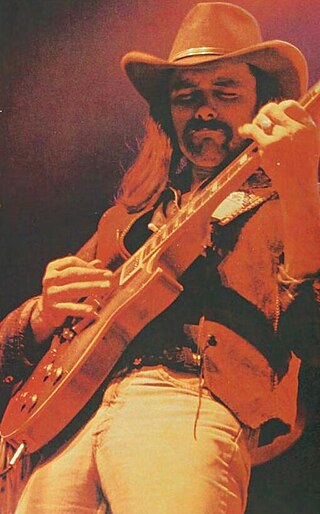
Forrest Richard "Dickey" Betts was an American guitarist, singer, songwriter, composer and founding member of the Allman Brothers Band. He assumed sole lead guitar duties during the peak of the group's commercial success in the mid-1970s and was the writer and singer on the Allmans' hit single "Ramblin' Man". Betts was inducted with the band into the Rock and Roll Hall of Fame in 1995. He was ranked No. 58 on Rolling Stone's 100 Greatest Guitarists of All Time list in 2003, and No. 61 on the list published in 2011.

The Allman Brothers Band is the debut studio album by American rock band the Allman Brothers Band. It was released in the United States by Atco Records' subsidiary Capricorn on November 4, 1969, and produced by Adrian Barber. Formed in 1969, the Allman Brothers Band came together following various musical pursuits by each individual member. Guitarist and bandleader Duane Allman moved to Jacksonville, Florida where he led large jam sessions with his new band, one he had envisioned as having two guitarists and two drummers. After rounding out the lineup with the addition of his brother, Gregg Allman, the band moved to Macon, Georgia, where they were to be one of the premiere acts on Capricorn.

Brothers and Sisters is the fourth studio album by American rock band The Allman Brothers Band. Co-produced by Johnny Sandlin and the band, the album was released in August 1973 in the United States by Capricorn Records. Following the death of group leader Duane Allman in 1971, the Allman Brothers Band released Eat a Peach (1972), a hybrid studio/live album that became their biggest-selling album to date. Afterwards, the group purchased a farm in Juliette, Georgia, to become a "group hangout". However, bassist Berry Oakley was visibly suffering from the death of Duane, excessively drinking and consuming drugs. In November 1972, after nearly a year of severe depression, Oakley was killed in a motorcycle accident, making it the last album on which he played.

"Jessica" is an instrumental piece by American rock band the Allman Brothers Band, released in December 1973 as the second single from the group's fourth studio album, Brothers and Sisters (1973). Written by guitarist Dickey Betts, the song is a tribute to gypsy jazz guitarist Django Reinhardt, in that it was designed to be played using only two fingers on the left hand.
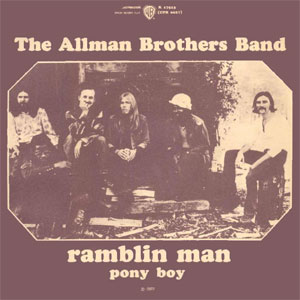
"Ramblin' Man" is a song by American rock band the Allman Brothers Band, released in August 1973 as the lead single from the group's fourth studio album, Brothers and Sisters (1973). Written and sung by the band's guitarist, Dickey Betts, it was inspired by a 1951 song of the same name by Hank Williams. It is much more grounded in country music than other Allman Brothers Band compositions, which made the group reluctant to record it. Guitarist Les Dudek provides guitar harmonies, and it was one of bassist Berry Oakley's last contributions to the band.
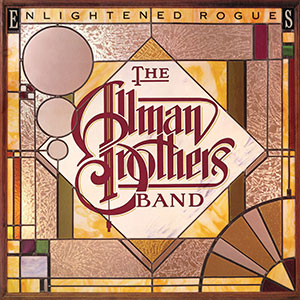
Enlightened Rogues is the sixth studio album by American rock band the Allman Brothers Band. Produced by Tom Dowd, the album was released in February 1979 in the United States by Capricorn Records and PolyGram Records elsewhere. The Allman Brothers Band had broken up in 1976 following internal turmoil, amplified by escalating drug use. The band members splintered into different acts — among those Great Southern, Sea Level, and the Gregg Allman Band. Guitarist Dickey Betts approached his bandmates in 1978 with the prospects of a reunion. It is the first to feature guitarist Dan Toler and bassist David Goldflies. Living together in Sarasota, Florida, they rehearsed and wrote the material for their next album in fall 1978.
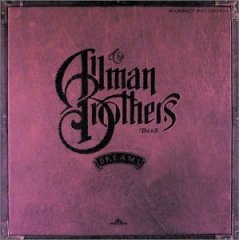
Dreams is a compilation album by the Allman Brothers Band. Packaged as a box set of four CDs or six LPs, it was released on June 20, 1989.

Seven Turns is the ninth studio album by the Allman Brothers Band, released in 1990. Their first studio album since Brothers of the Road in 1981, it was well-received, and peaked at #53. Hit singles were "Good Clean Fun" ; "Seven Turns" (#12) and "It Ain't Over Yet" (#26).
"Blue Sky" is a song by the American rock band The Allman Brothers Band from their third studio album, Eat a Peach (1972), released on Capricorn Records. The song was written and sung by guitarist Dickey Betts, who penned it about his girlfriend, Sandy "Bluesky" Wabegijig. The track is also notable as one of guitarist Duane Allman's final recorded performances with the group. The band's two guitarists, Duane Allman and Dickey Betts, alternate playing the song's lead: Allman's solo beginning 1:07 in, Betts joining in a shared melody line at 2:28, followed by Betts's solo at 2:37. The song is notably more country-inspired than many songs in the band's catalogue.
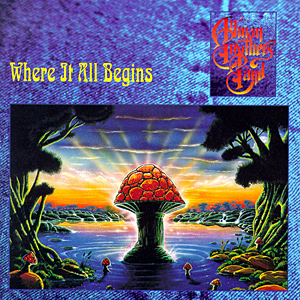
Where It All Begins is the eleventh studio album by the Allman Brothers Band. "No One to Run With" obtained the most album-oriented rock airplay, while "Soulshine", written by Warren Haynes, gained success as a concert and fan favorite. Gregg Allman also started to confront his substance abuse problems in the past on songs such as "All Night Train". The album sold considerably better than its predecessor, Shades of Two Worlds. In 1998, the album went Gold. Nevertheless, critical reception was weaker. This was also the last studio album the group recorded with original guitarist Dickey Betts.

"Midnight Rider" is a song by the American rock band the Allman Brothers Band. It was the second single from their second studio album, Idlewild South (1970), released on Capricorn Records. The song was primarily written by vocalist Gregg Allman, who first began composing it at a rented cabin outside Macon, Georgia. He enlisted the help of roadie Robert Kim Payne to complete the song's lyrics. He and Payne broke into Capricorn Sound Studios to complete a demo of the song.

Reach for the Sky is the seventh studio album by the rock group the Allman Brothers Band, released in 1980. It was the last album to feature drummer Jai Johanny Johanson until his return on the Seven Turns album.

Brothers of the Road is the eighth studio album, and the tenth album overall, by the rock group the Allman Brothers Band. Released in 1981, it is the band's only album without drummer Jai Johanny Johanson, the last to feature bassist David Goldflies and guitarist Dan Toler, and the only one to feature drummer David Toler. The song "Straight from the Heart" was the group's third and final Top 40 hit. It was also the first Allman Brothers album to not feature an instrumental song.
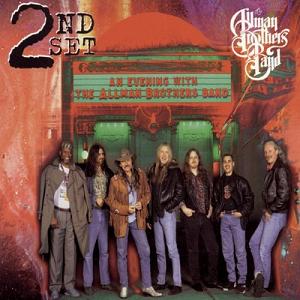
An Evening with the Allman Brothers Band: 2nd Set is a live album by the American rock group the Allman Brothers Band. It was recorded in 1992 and 1994, and released in 1995. The recording of "In Memory of Elizabeth Reed" was nominated for a Grammy Award for Best Pop Instrumental Performance at the 38th Annual Grammy Awards, but it lost to "Mariachi Suite" by Los Lobos. The recording of "Jessica" included on the album won a Grammy Award for Best Rock Instrumental Performance at the 38th Annual Grammy Awards in 1996.
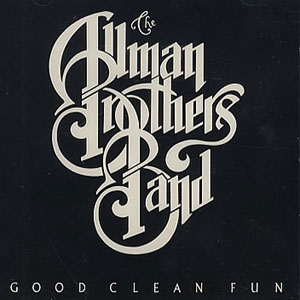
"Good Clean Fun" is a song by American rock band the Allman Brothers Band, released in July 1990 as the lead single from the group's ninth studio album, Seven Turns (1990). Written by guitarist Dickey Betts, vocalist Gregg Allman and songwriter Johnny Neel, the song was the band's first single since their 1982 breakup.

"Revival", sometimes listed as "Revival (Love Is Everywhere)", is a song by the American rock band the Allman Brothers Band. It was the lead single from their second studio album, Idlewild South (1970), released on Capricorn Records. The song was written by guitarist Dickey Betts, his first songwriting credit for the group.
Betts, Hall, Leavell and Trucks, often referred to as BHLT, was an American musical group that existed from 1982 to 1984 and that featured former members of The Allman Brothers Band and Wet Willie. Despite a positive reception for their live performances, the group never got a recording contract.

Brothers of the Road is a concert video by the rock group the Allman Brothers Band. It includes songs from two concerts, one at the University of Florida Bandshell in Gainesville, Florida, and one at the Capitol Theatre in Port Chester, New York. It also includes several songs from a hotel room jam session, and several songs from an "unplugged" studio session. It was released as a VHS videotape in 1982, and as a DVD in 1998.


















